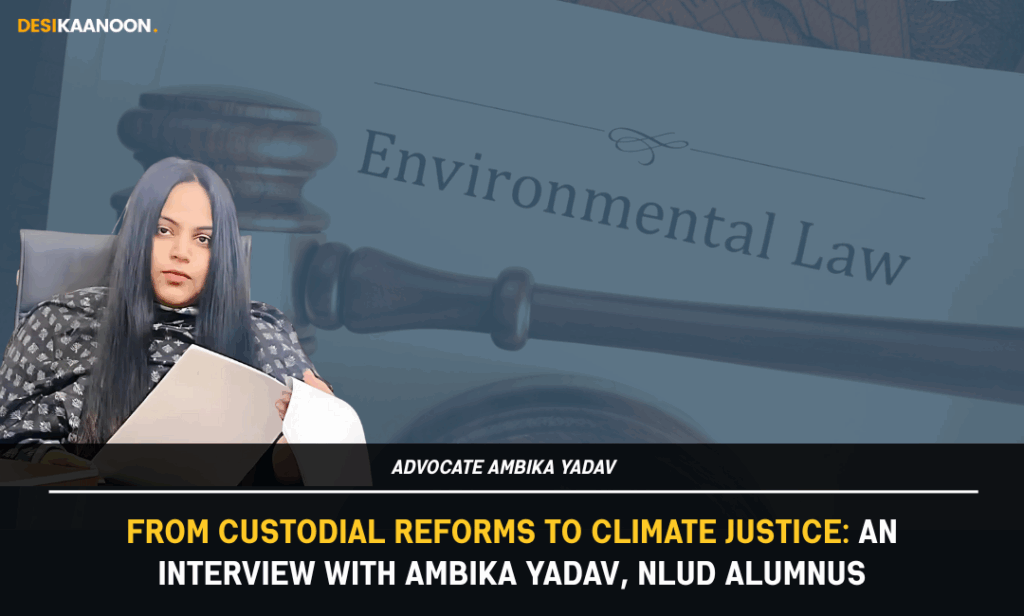Meet Ambika Yadav, an alumnus of NLUD, an Independent Practitioner at Gurugram Courts with expertise in criminal, commercial & environmental law, handling PILs, NGT & Supreme Court matters.
Q1: With rising concerns around custodial deaths and institutional apathy (e.g., recent Bhondsi-type incidents), what reforms do you think must be non-negotiable in our criminal justice system?
A: Custodial deaths in India are not just about individual acts of brutality—they reflect deep systemic failures. If we’re talking about non-negotiable reforms, here are some that are inevitable.
- Mandatory independent inquiries into every custodial death, led by a body outside the police or court bodies.
- Automatic suspension and prosecution of officers involved, rather than “departmental enquiries”.
- The Supreme Court already directed the installation of CCTV cameras in all police stations and lock-ups (2020 order), but compliance is not uniform. This must be strictly enforced with penalties for non-compliance.
- Immediate medical examination after arrest, repeated every 24 hours, with reports sent directly to magistrates to determine the cause of death. Fast-track courts and compensation to the victim’s family are a few other measures to curtail the damage done.
Q2. You’ve litigated on issues like illegal deforestation in the Aravallis. How do you perceive the current dilution of environmental safeguards under urbanisation pressures?
A: Legal Safeguards Are Being Weakened by Policy, acts are twisted, ordinances and notifications are passed to weaken the legislative intent behind environmental safeguard acts by state governments. In simple words, it’s the commercialisation/ profitisation that is winning over sustainable development.
Q3. The political landscape often sidelines strong legal voices, especially women. As a female lawyer with experience in both courts and party corridors, what is your take on the shifting (or not-so-shifting) gender power dynamics?
A: More young women are entering litigation, activism, and party politics with unapologetic ambition. They are refusing to be confined to “gendered portfolios.” Social media and public platforms are amplifying women’s voices in ways that bypass old gatekeeping structures. The landscape is shifting, but power itself has not been de-gendered. Women lawyers and politicians still walk into rooms where the rules were written by and for men. Real change will come not just when more women enter, but when institutional cultures—courts, parties, bar associations—reshape themselves to value women as equals, not tokens.
Q4. As per the experience of judging moot courts and attending global conferences, what do you feel is most lacking in today’s legal education system in India?
A: Enthusiastic teachers and eager to learn students.
Q5. The intersection of legal innovation and environmental justice is rarely explored in depth. What’s one legal mechanism you think India must develop to tackle climate injustice?
A: Explicitly enshrine in law that every citizen has a right to climate resilience and a healthy environment, drawing from Article 21’s right to life. Ensure this right is justiciable, i.e., people can move courts to enforce it.
Q6. What’s your take on the recent mandate of 3-year practice, especially for women from tier-3 or rural areas? How can the need for real-life exposure and women’s empowerment in the judiciary be constructively addressed and balanced?
A: Many women law graduates from smaller towns face family and social pressures that make a 3-year practice period financially and socially hard to sustain. Safety issues, lack of chambers to train under, and unequal access to bar networks add further hurdles. But as I say, where there is a WILL, THERE IS A WAY. WOMEN SHOULD LEARN TO FIGHT FOR THEIR DREAMS.
Q7. With AI beginning to reshape legal research and access, how should young lawyers prepare to stay ethically and intellectually ahead?
A: AI is a tool, learn from it, add your personal touch and create a masterpiece.

